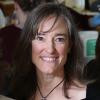
Contact Christina
Mail Code NS
Christina Cianfrani
Cole Science Center 312
413.559.6048

Mail Code NS
Christina Cianfrani
Cole Science Center 312
413.559.6048
Christina Cianfrani received her B.S. from the University of Pennsylvania, M.S. from Yale University, and Ph.D. in civil and environmental engineering from the University of Vermont.
Her research focuses on watershed processes approached from an ecological and engineering perspective. Specifically, she explores the effects of urbanization on stream systems and conducts basic geomorphological research relating hydrologic stream characteristics with biotic integrity. To conduct these interdisciplinary research projects she partners with local and state agencies, research institutions, non-profit organizations, and private consultants.
Her teaching interests include watershed hydrology, stream ecology, sustainable water resources, stream restoration, and fluvial geomorphology.
Where do we get clean water? Where does water go when it rains? This course explores these topics using a systems thinking approach to gain an understanding of how our water resources are tied to the surrounding ecosystem and human populations. Topics include the water cycle, hydrologic budgets, urban impacts and low impact development/green design. Students will read primary literature, complete problems sets, compute water budgets, and complete a group design project designed to address a water use/treatment challenge. At the 100-level no previous experience is needed. At the 300-level, students will be expected to lead project groups and complete more advanced assignments. Students will work collaboratively on project and in-class activities throughout most of the semester. We will use the Hampshire College campus as a living laboratory with occasional field trips. This class is designed with a commitment to accessibility and to providing access to students of all backgrounds and abilities. Keywords:Hydrology, environmental science, water resources
This course will use a natural science lens to explore sustainability with a specific focus on the food-water-energy nexus. We will use the United Nations Sustainable Development Goals as one framework of study covering the implementation of the goals on a global scale as well as efforts underway locally and regionally. Students in this class will read primary literature, complete case studies, work collaboratively and independently on sustainability projects and actively participate in small group and class discussions and activities. We will use elements of the Hampshire College campus living laboratory as points of discussion, taking fields trips when possible, including: the net zero energy/water living building, the solar array and the college farm center. Keywords:Sustainability, environmental science, systems thinking
Floods, droughts, hurricanes and other extreme weather events have been increasing in response to climate change. How will these and other climate change effects impact our access to freshwater? How will we adapt to these changing conditions? This class will cover a brief introduction to the science behind climate change prediction and modeling and look specifically at the impacts to the water cycle and water resources. Students will read and discuss scholarly literature, work in project teams to collect and interpret data and learn the skills scientists use to analyze climate and water-related issues. This course will use the Hampshire Campus as a living laboratory and may involve short field trips to sites on campus. This class is designed with a commitment to accessibility and to providing access to students of all backgrounds and abilities Keywords:Environmental science, climate change, systems thinking
Wetland ecosystems are biologically important habitats and provide many ecosystem services including flood control, water filtration, and groundwater recharge. Constructed wetlands use these principles to treat waste generated by humans (e.g. stormwater, greywater, wastewater). In this course we will study the design, hydrology, and nutrient and pollutant cycling of natural and constructed wetlands. Students will read scholarly literature, complete problem sets, and work collaboratively in the field and laboratory to sample and analyze soils, vegetation, and water from wetlands on the Hampshire College campus. During the second half of the semester, students will design and carry out their own research projects. This class is designed with a commitment to accessibility and to providing access to students of all backgrounds and abilities. Students that take Wetlands for Water Treatment must also enroll in Wetlands for Water Treatment LABORATORY (NS-233). Keywords:environmental science, hydrology, natural resources, ecology
In this course, students will have the opportunity to put into practice the skills and knowledge they gain from discussion and reading the scholarly literature about wetlands in NS232. We will use the Hampshire College campus as a living laboratory to explore both natural and constructed wetland ecosystems. We will sample soils, vegetation, and water and analyze and interpret our results. During the second half of the semester, students will design their own projects identifying a question of interest, selecting appropriate methods to explore their research question, carrying out their research and synthesizing and presenting their results (this course meets the Division II Supported Project requirement). This class is designed with a commitment to accessibility and to providing access to students of all backgrounds and abilities. Students that take Wetlands for Water Treatment LABORATORY must also enroll in Wetlands for Water Treatment (NS-232). Keywords:environmental science, hydrology, natural resources, ecology